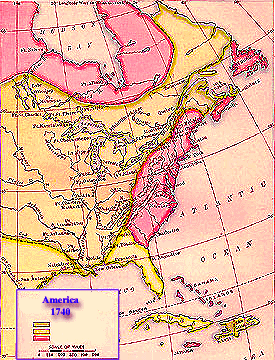ASSESSMENT
![]()
Complete this assessment to find out what you know about the Iroquois Confederacy and its influence on the development of the US Constitution. Use the assessment before and after completing the project to determine what you have learned.
PDF
version of the assesessment
The PDF version requires Adobe Acrobat Reader. If you do not have Adobe
Acrobat Reader installed on your computer, you can download
it for free.
Please answer the questions below.

![]()
1. On the map above, the three colors (yellow, tan and pink) highlight areas controlled by European powers in 1740. What European country controlled which shaded area?
Yellow ____________, Tan____________ and Pink_____________.
2. Which two of these European powers were in conflict with each other over the area controlled by the Iroquois Confederacy.
3. The areas which border each other and include the home lands of the Iroquois Confederacy are part of which of the 50 United States.
![]()
Directions: Please write the correct letter for each question on the line provided.
______4. Before the Revolution, which group was governed by a Democracy.
a) The British b) The Iroquois Confederacy c) The Colonists d) The French
______5. Which Founding Father was the first head of Pennsylvania's Bureau of Indian Affairs?
a) Ben Franklin b) George Washington c) Thomas Jefferson d) George Morgan
______6. TRUE/FALSE: It is the women of the Iroquois Confederacy who nominate leaders to serve on the tribal council.
______7. TRUE/FALSE: Wampum diplomacy is the use of Indian money to buy land.
![]()
Vocabulary- The Iroquois and the Constitution
Directions: Write the letter of the correct definition next to the word in the left column.
| _____1. Confederacy |
A.
Indian chief of Iroquois Confederacy
|
| _____2. Oratory |
B. Beads of polished shells, used as ceremonial pledges, money and reminders of oral histories |
| _____3. Treaty |
C.
The art of speaking well in public
|
| _____4. Sachem |
D.
A tribe of the Iroquois Confederacy
|
| _____5. Ethnocentrism |
E.
Freedom from the rule of others
|
| _____6. Onondaga |
F.
Negotiated agreement between governments
|
|
G. The belief that one’s group is better than others |
|
|
H.
People or nations united for a common purpose
|
![]()
Directions: Please write a short essay on each question.
7. Explain what the Great Law of Peace is and give two examples of how it is similar to the US Constitution.
8. What is the Iroquois Confederacy?
Home Page | Assessment
| Lesson 1 | Lesson
2 | Lesson 3 | Lesson
4 | Frontier
Characters
Learning Aids | Great
Law of Peace | US Constitution | Timeline
| Works Cited
© 1 October 2001, Portland State University